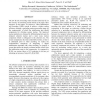Free Online Productivity Tools
i2Speak
i2Symbol
i2OCR
iTex2Img
iWeb2Print
iWeb2Shot
i2Type
iPdf2Split
iPdf2Merge
i2Bopomofo
i2Arabic
i2Style
i2Image
i2PDF
iLatex2Rtf
Sci2ools
128
click to vote
ICMCS
2006
IEEE
2006
IEEE
Reuse of Motion Processing for Camera Stabilization and Video Coding
The low bit rate of existing video encoders relies heavily on the accuracy of estimating actual motion in the input video sequence. In this paper, we propose a Video Stabilization and Encoding (ViSE) system to achieve a higher coding efficiency through a preceding motion processing stage (to the compression), of which the stabilization part should compensate for vibrating camera motion. The improved motion prediction is obtained by differentiating between the temporal coherent motion and a more noisy motion component which is orthogonal to the coherent one. The system compensates the latter undesirable motion, so that it is eliminated prior to video encoding. To reduce the computational complexity of integrating a digital stabilization algorithm with video encoding, we propose a system that reuses the already evaluated motion vector from the stabilization stage in the compression. As compared to H.264, our system shows a 14% reduction in bit rate yet obtaining an increase of about 0.5...
Related Content
| Added | 11 Jun 2010 |
| Updated | 11 Jun 2010 |
| Type | Conference |
| Year | 2006 |
| Where | ICMCS |
| Authors | Bao Lei, Rene Klein Gunnewiek, Peter H. N. de With |
Comments (0)

